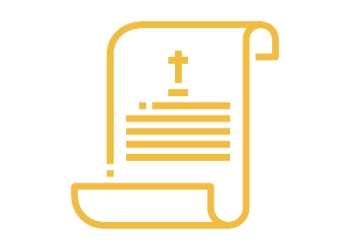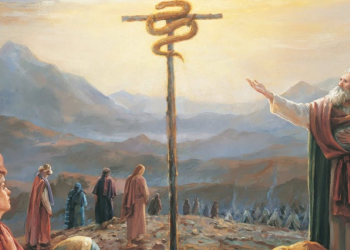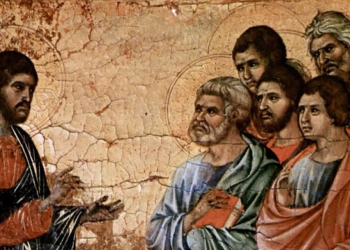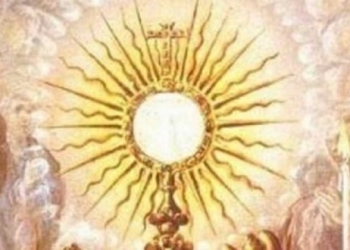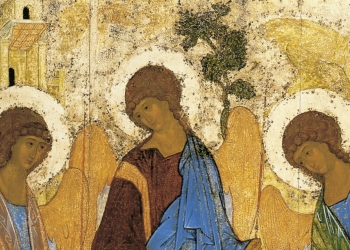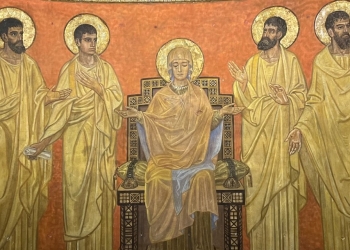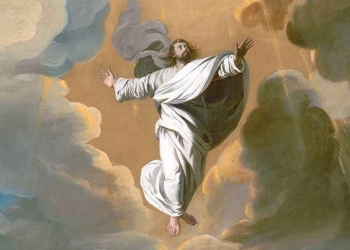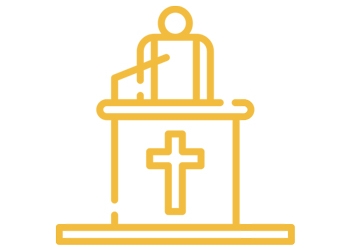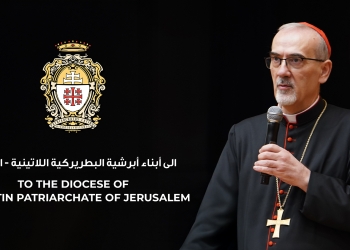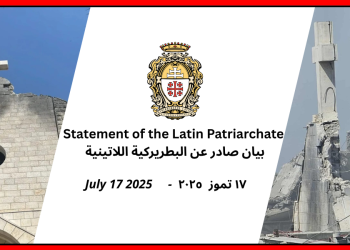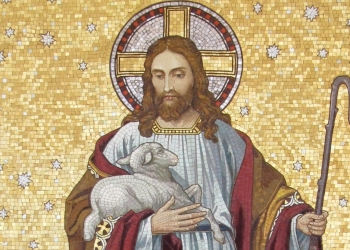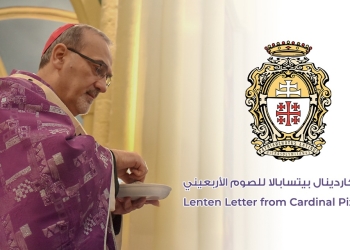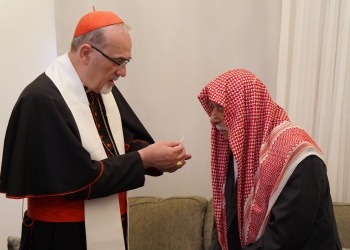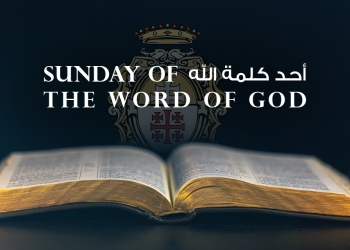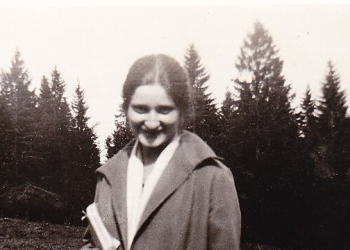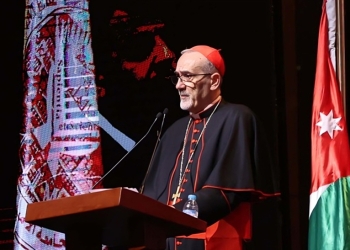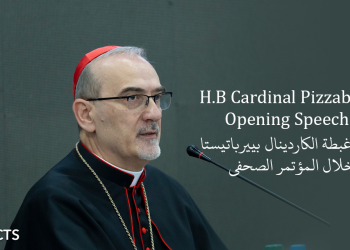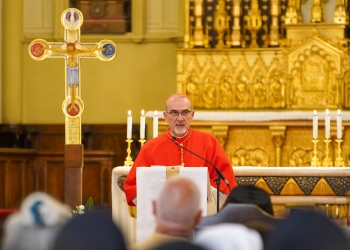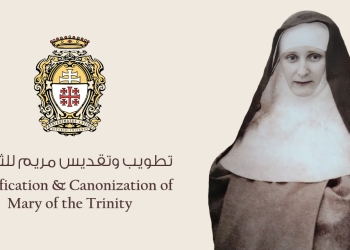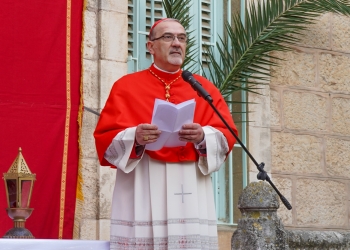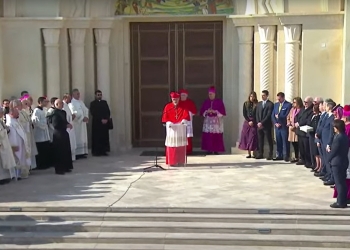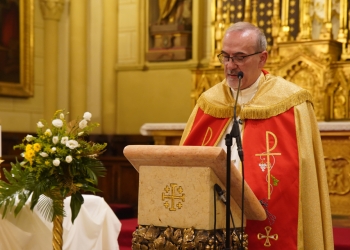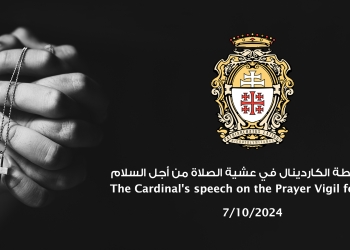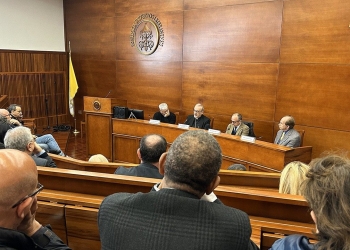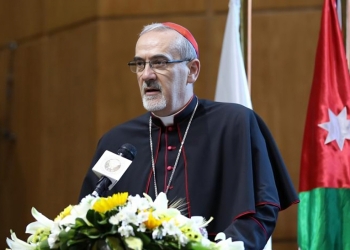Conference in Milan - February 12th, 2022
By forcing or by giving
Introduction
In this Conference "Mondialità 2022", organized by the Archdiocese of Milan and promoted by Pastorale missionaria, Pastorale migranti and Caritas Ambrosiana, at the center of which you have put the theme of forgiveness, I have been asked to talk about some personal experiences and reflections in the Israeli-Palestinian context, regarding both the paths of reconciliation that have started to be built and those that are obstructed or not yet existing.
Peace and reconciliation in the Holy Land, on the one hand, seem to be utopian ideals, far from any concrete possibility of implementation. On the other hand, they are indispensable themes, waiting for urgent solutions. This paradox is due to the fact that the Holy Land is the crucial place where atavistic tensions, political interests, religions and different cultures intertwine. The conflict there is not only made of physical violence, armed interventions and suicide bombers; it is much more. It is a modus pensandi et vivendi that permeates people's cultures and mentalities. To give just one example, in Palestinian geography textbooks, an apparently neutral discipline, Israel is absent from the maps, just as in Israeli textbooks Palestine does not exist. Therefore, the violent aspect of the conflict is only the tip of a very huge iceberg.
However, I would like to clarify right away that the Holy Land is not only this, is not only a land of conflicts. It is also the cradle of our Western culture and to a great extent of our Eastern culture as well. "All were born there", says Psalm 87 (86): our roots lie in the Holy Land and what happens here has repercussions in the rest of the world. So, if on the one hand, this land appears to be hopeless, due to the secular experience of conflict, it still remains the place that nourishes the hope of Jews, Christians and Muslims: and the contradiction is only apparent because, while hatreds seem to erect impenetrable fences, the Holy Land remains the place, unique and fascinating, where the three monotheistic religions coexist and are "forced" to meet.
1.0 What the Bible Says
Let me begin with a brief look at the biblical text. I do not intend to make a biblical treatise on forgiveness, but I believe that it is necessary - before entering into the heart of my proposal for reflection - to take at least a glance at the sacred text, in order to have an intuition, if only very brief, a direction, as to how forgiveness has been understood in the history of revelation, which still remains for us today the founding reference for our reflection.
Forgiveness (סְלִיחָה slicha), in the Old Testament, is understood as the decision to no longer consider sin as an obstacle in the interrupted relationship (with God, among men). It is an act that depends on the will of the one who forgives and not on an external action or gesture, and it is initially linked to a request for forgiveness by the sinner/guilty.
The term "sinner" is expressed literally as: "the one who bears the sin/guilt upon himself". In the OT, one of the oldest expressions expressing the act of forgiving is precisely "to carry, to take upon oneself the sin of another" (נושא חטא/עוון/ וכו׳). God who forgives is God who bears, who takes upon himself the sin of the one who committed it. Translations cannot always render this idea and often translate bearing the sin simply as forgiving.
(cf. Lev 7:18; Num 9:13: man must take his sin upon himself, he is to be considered a sinner; or Ex 34:7: God bears the sin of his people, that is, he forgives his people; or Gen 50:17: Joseph's brothers ask him to "take upon himself" their sin against him, that is, to forgive them).
Forgiving, that is, "taking upon oneself the sin of others," does not mean, however, taking on the consequences of the evil committed (penalty, punishment), which often remain on the shoulders of the forgiven sinner. Moses, for example, is forgiven for his unbelief, but does not enter the Promised Land, nor do the unbelieving people (cf. Num cc. 13-14).
There is another word for forgiveness besides slicha סליחה: kapparah כָּפָּרָה. The latter, unlike the former, is linked not only to a will, but also to a precise external gesture, often related to worship. The kapparah is obtained through sacrifices in the temple, for example, or through a similar ritual. It is an act performed generally through mediators (priests, prophets or others). Over time, it can become only an outward gesture, unrelated to a sincere will. The preaching of the prophets will often be against this form of hypocrisy.
In the later period, after the failures of the Israelite monarchies, after exile and national political catastrophes, there is a new understanding of forgiveness. National and personal failures have slowly led to the understanding that forgiveness can only be the fruit of God's gratuitousness, because man alone cannot be faithful to the covenant; instead, he goes from one failure to another. In Is 44:22, God forgives first, without the people repenting and asking for forgiveness, and then pleads with the sinner to repent. Forgiveness is no longer an act linked to previous repentance, but is a totally free gesture, an expression of God's free will. [In the prophets God forgives on His own initiative, not because of the faithfulness or goodness of the people, but because of His faithfulness to the Covenant and the promises: Is 33, 24; Jer 31, 33; 33, 8; 50, 20; Ez 16, 63; Mic 7, 18, etc.].
This is an important passage that prepares and introduces the preaching of Jesus and the novelty of Christian forgiveness, which has its heart in the cross. Jesus takes upon himself, assumes the sin of humanity, he is the redeemer, who also frees us from sin and its consequences. It is the way God has forgiven us once and for all.
In conclusion: forgiveness is not a synonym of erasure. The sin, the wound, remains, but - in a certain sense - it is assumed, shared. To forgive means to take upon oneself the sin of others, to decide that that sin, that fault, does not interrupt the relationship. This always requires, however, a path of understanding as well. God forgives first, as we have seen, but at the same time, He also asks that we return to Him (Is 44:22).
The Bible, then, presents us with the highest form of forgiveness, which is also the highest form of justice.
As doing justice, in the Bible, means putting things in order according to God's plan, in the relationship with him, in human relationships, in the care of creation. Man can never do this alone. Only God's mercy, His forgiveness, will be able (so to speak) to "even the score" with man, that is, to do "justice".
This brief excursus, however hasty, can help us to focus on our theme and to define areas of our reflection.
2.0 The personal dimension
"Forgiveness is above all a personal choice, a decision of the heart to go against the natural instinct to pay back evil with evil. The measure of such a decision is the love of God who draws us to himself in spite of our sin. It has its perfect exemplar in the forgiveness of Christ, who on the Cross prayed: 'Father, forgive them; for they know not what they do' (Lk 23:34)." (Saint John Paul II, Message of Peace 2002, n.8). These are the words of Pope John Paul II in his message for World Day of Peace 2002. Before speaking of the public or political dimension of forgiveness, in fact, we must begin with the personal dimension, which is its foundation. Pope John Paul, in the same message, states: "forgiveness inhabits people's hearts before it becomes a social reality. Only to the degree that an ethics and a culture of forgiveness prevail can we hope for a “politics” of forgiveness, expressed in society's attitudes and laws, so that through them justice takes on a more human character." (Ibid 8).
These two important statements are already an indication of a method as well as content. Forgiveness is rooted in the love of God, and it requires, first of all, a personal journey, a path of understanding, of "assumption", referring to what we have just said in the biblical section. It can never arrive by inertia. The evil committed cannot be forgotten, but requires a precise will to overcome, which is the fruit of a clear and definite desire. It does not erase the wrong done, but wants to overcome it for a greater good. Trying to forget, waiting for time alone to heal the wounds, not taking on the evil committed, identifying it, looking it in the face, calling it by its name, means making forgiveness a banal gesture, which does not heal any wound, does not change people's hearts and does not produce peace.
John Paul II, in the path of preparation for the Jubilee of 2000, also wanted to start a path of purification of memory, which aroused much controversy, but which was an important intuition: in order to look to the future with hope and in peace, it is necessary not to forget, not to wait for the problem to be resolved by itself, but to create a path of purification of memory, that is, of the memory of the evil done and/or suffered, to revise the interpretation in the light of the current conscience, to assume it and then to overcome it. A precise will is required for this, a positive action of encountering evil. If wounds are not healed, taken on board, processed and shared, they will continue to produce pain even after years or even centuries. They create, in fact, an attitude of victimhood and anger, which make reconciliation difficult, if not impossible. Let us think, for example, of our relationship with other non-Christian religious communities: how difficult it is still today to be in a serene relationship with Judaism and Islam! As long as there is no purification of the common memory on the part of everyone, as long as there is no mutual recognition of the evil committed and suffered by each other, as long, in short, as there is no reinterpretation of their historical relations, the wounds of the past will continue to be a burden to carry on one's shoulders and a criterion for interpreting mutual relations.
In the Holy Land even today, for example, very few are aware the steps the Church took toward Judaism and Islam, and often, for many people, we remain those responsible for the Crusades, for persecutions, for inquisitions, etc.
Let me use a biblical icon. In Gen 37, Joseph, in search of his brothers, is wandering through the countryside, where he meets a man who asks him, "What do you seek?" (v. 15). He answers: "I am looking for my brothers" (v. 16). This is how the story of Joseph opens, as if to indicate that every man has within himself a deep yearning for fraternity.
As we know, in the case of Joseph, this yearning will be tragically disregarded. He, in fact, will be the victim of a tremendous injustice: betrayed and sold by his own brothers, he will be deported, a migrant, a slave, a prisoner. The wound inflicted is great. However, after the long journey of reconciliation that Joseph and his brothers will experience, he says a beautiful sentence: "I am your brother Joseph, the one you sold into Egypt! And now, do not be distressed and do not be angry with yourselves for selling me here, because it was to save lives that God sent me ahead of you.(...). So it was not you who sent me here, but God" (Gen 45:4-5, 8).
Joseph, in the light of faith, can overcome his wounds. Far from feeling only like a victim, he affirms that in everything, even in the injustices he has suffered, there is God's plan, who guides history for the good of his chosen ones. Joseph was thus able to reinterpret his own tragic experience. After those words, he kisses all his brothers and weeps, then he begins to converse with them (v. 15), as if to say: only now can the true dialogue begin, after having reviewed, step by step, his own difficult story!
(It is no coincidence that St. John XXIII (his second baptismal name was indeed "Joseph"!), receiving on October 17, 1960, a delegation of Jews, addressed to them the phrase: "I'm Joseph your brother!". By saying this, the Pontiff wanted to open a new era of reconciliation and rediscovery of fraternity between the Catholic Church and the Jewish people, after more than sixteen hundred years of estrangement, enmity, and persecution. The path of reconciliation is not resolved, therefore, in a "good" embrace: it is often marked by past and present wounds. It is not a question of a superficial amnesty, but of taking on one's own and the other's wounds).
2.1 Forgiveness as a human gesture
"Forgiveness, therefore, has a divine root and measure. This, however, does not exclude the possibility that its value can also be grasped in the light of considerations of human reasonableness. First and foremost, there is the experience that human beings have within themselves when they commit evil. He then becomes aware of his own frailty and desires that others be merciful to him... [Why, then, should we not do to others what each of us wishes to be done to ourselves? Every human being cultivates within himself the hope of being able to begin again on a new path of life and not to remain a prisoner forever of his own errors and faults. He dreams of being able to lift his gaze to the future again, to discover a prospect of trust and commitment."] (Ibid, 8).
Faith naturally has the capacity to open the believer to a relationship, because it opens him to an encounter with God, which then naturally also becomes a look at the other from oneself.
But what is also needed is a human education in forgiveness, a cultural formation that allows man to look at events not exclusively from the perspective of his own wounds, which always have a limited and closed horizon. It helps him to interpret events, both personal and collective, with a look towards the future, one that also takes into account the good of the surrounding human and social reality, the need to reactivate the dynamics of life.
The first fruit of forgiveness is the freedom from the emotional ties produced by resentment and revenge, which imprison every perspective of relationship within a circle of pain and violence. Forgiveness allows the healing of the human soul, reactivates the dynamics of life and, I repeat, opens up the future.
Also in the masterful message of peace of 2002, written after 9/11, which was the beginning of a terrible period for the international community and especially for Middle Eastern countries, John Paul II stated that without forgiveness there can be neither justice nor peace: forgiveness, peace, and justice are necessary to each other at the same time.
2.2 Some examples
In the Holy Land, we still find ourselves in a situation of wearisome conflict, full of resentment and injustice. It has a decisive influence on local religious, social and political dynamics, locking everyone in their own pain and fear, and making it difficult to listen to and understand the other.
Yet, there are many people, Israelis and Palestinians, who meet each other and who, despite having been affected in one way or another by the conflict, are not afraid to continue to dialogue and to believe in peaceful coexistence. I am thinking, for example, of the Parents Circle-Families Forum (parents or relatives of victims of the conflict, Israelis and Palestinians, who have decided to unite in order to activate dynamics of reconciliation and encounter, so that others will not suffer as they have suffered), or Women Wage Peace; or the writer Grossman, who has a strong influence.
Among the civil initiatives, I also think of the Jerusalem Intercultural Center. Composed of Israelis and Palestinians, Jews, Muslims and Christians, it works to improve the lives of the city's inhabitants, regardless of their affiliations. It aims to fill an appalling gap in the education of children, trying to make them learn about the religious traditions of each community they belong to.
Mention should also be made of the many Christian schools. This is one of the significant contributions that the Christian community offers to its fellow citizens. There are thousands of students who go to our schools, mostly Muslims and Christians. It may seem trivial, but where everything leads to create distinctions between people, where the boundaries of identity are so strong, studying and living together is a concrete way to learn to respect differences.
Our schools welcome mainly Christians and Muslims for linguistic reasons, because both speak Arabic. But there are also bilingual schools, such as the Hand-in-Hand network, founded by a Muslim and a Jew, where pupils study both in Arabic and Hebrew, with two teachers in each class.
There are also countless training and information initiatives organized by various public and private associations.
And there are other initiatives of a different nature as well, very close to me personally. There are groups of young and old who do not want to limit themselves to social, historical and cultural meetings. They want to understand each other's reasons and faith. These groups are dedicated to the reading of sacred texts: they do not advertise and nothing is publicly known about them, and perhaps for a long time this will still be the case, but they are numerous and growing continuously. They are Israeli Jews who read and comment, together with Arab Christians, the Old Testament; beginning with the less demanding texts, up to the texts that speak of land, inheritance, promises, covenant, themes subject to different interpretations and with an evident political character. But we also read the New Testament together, we talk about Jesus, we share our knowledge of Him.
These are only a few - but significant - examples of how complex the construction of a mentality of reconciliation can be, how it requires active and conscious participation, great will, and desire, and how it is made possible only starting from an awareness and a serious desire for relationship.
It will not be possible to overcome the obstacles standing today in front of reconciliation, nor to plan a serene future, if one does not have the courage to purify one's reading of history from the enormous amount of pain and injustice that still heavily conditions the present and the choices that are often made today. It is not a question of forgetting, certainly. However, it will be very difficult to build a serene future if one places "being a victim" at the basis of one's social and national identity, instead of basing one's prospects on a common hope.
This, of course, raises the question: how to rethink history and memory, how to talk about forgiveness, as long as my present is marked by injustice and pain?
It is precisely on this decisive point that interreligious dialogue in the Middle East cannot avoid confronting itself, bringing its irreplaceable contribution to the rest of the world. It is an increasingly necessary dialogue; the only one that can lead our respective religious and social communities out of the impasse in which they find themselves today; the only one that can help them find prospects for hope.
Once the shell of fear and victimhood has fallen, at least in part, it will be possible to savor the taste of being close to everyone. In order to break down walls and fears, we need to get to know each other and meet, creating concrete opportunities for dialogue. From experience, I maintain that this is possible even in the land of conflict par excellence. The courage of peace is an even greater, passionate challenge: it produces in the human heart a radical change, better indicated by the word teshuvà, "return": to the other and to God. To go in search of one's brother, overcoming wounds and victimhood, is a long journey, where one can "fall into the pit"; but it is nevertheless a journey guided by God, who is capable of transforming evil into good, wounds into opportunities for reconciliation, what is disfigured into the Transfigured.
3.0 The Political Dimension
In the personal context, forgiveness, peace and justice can easily be declined together. What I mean is that, as difficult and as demanding as this human and religious journey may be, it nevertheless only involves a personal relationship or, at any rate, a limited context; one defined only by the wounded and the offender/perpetrator.
At the social and political level, however, the dynamics are different. The timescales are necessarily longer and the paths often much more complex, because they must take into consideration not a personal relationship or one of a specific context, but a social one. In other words, everyone's wounds, everyone's pain must be taken into consideration; as well as the necessarily different understandings of the events at the origin of that common pain, the different times of understanding... In short, it is not possible to transfer sic et simpliciter the personal dynamics within the social and political context.
It is necessary to act extensively in all spheres, political, religious and civil, to act at the same time, and to include the different groups of gathering and shaping of thought, such as schools and mass media. Because people interact at all these levels together, and forgiveness, in its function of healing, can act only if it involves all the fibers of their beings.
Forgiveness, in a public and open context, which involves all the ramifications of civil life, requires a path similar to the one we spoke of earlier, to avoid the risk, here even greater, of trivialization, the consequences of which can be unpredictable. It is evident that the times and dynamics thus become more complex, because the relationships between the different spheres of social and public life do not always work. And the times are not the same for everyone, the wounds left in the hearts of people do not require the same care for everyone.
I am thinking for example of what happened in Colombia, not to always remain in the Holy Land. After years of guerrilla warfare between government forces and FARC, which made thousands of victims and led to very serious family tragedies, the referendum from a few years ago, which should have decreed the end of hostilities and national reconciliation, failed miserably. It came too quickly, without any assumption of responsibility, without a path of preparation in the various spheres of public life, without a real listening to the pain still present. It seemed to be a trivialization and superficial closure of wounds that were, in fact, still bleeding. Meanwhile, in South Africa, it took years of discussion, the creation of special commissions to listen... In short, it was not possible to close a painful period without first following a path of listening and healing.
It should be added that the lack of forgiveness has enormous human and economic consequences. The refusal to reconcile has enormous costs, since it requires investments in armaments, disrupts the lives of families, prevents economic growth... In short, it creates destruction at all levels of civil life.
Reconciliation, on the other hand, can become a source of growth for all. The huge resources used in the Holy Land to maintain the conflict are at the expense of development and growth. In Israel, for example, the defense budget covers more than half of the state's expenditures. Security is the first concern for Israelis. On the other hand, the majority of the few resources the Palestinians have are used for political struggle, at the expense of the development of the territory.
Politics and religious institutions have an important role to play in the shaping of this conscience of forgiveness, but they cannot force times and ways: the conscious participation of all the different social realities of the community is indispensable, and these dynamics are necessarily slow and complex. In the Holy Land, we really learn to know how to wait, to respect each other's time, without forcing it. This means knowing how to stay with foresight and patience within these continuous relational tensions, made of suspicion and at the same time of research. We are continually asked by circumstances to give meaning to these expectations, not to pretend that our times must necessarily be those of others.
Forgiveness cannot be imposed or demanded. Never. It is always the fruit of an act of will, of love, of a desire to meet, to live. A true "for-giving" is always a gift received and delivered. It is an option of the heart, personal or collective. It cannot be a choice that comes from the outside. In Colombia, forgiveness was forced, and it didn't work. It can never work. Politics and religions, I repeat, have a fundamental role to play in education for reconciliation, in creating the context for an approach to forgiveness, but they can never impose reconciliation. It is necessary to give people time and to respect the pain of those who suffer, but also to help them re-read their own history, allowing the wounds to heal.
There have been several agreements signed between Israelis and Palestinians. I am thinking in particular of the Oslo Accords, which should have been the beginning of the cessation of hostilities between these two peoples and led them to a definitive resolution about their future. For years there have been talks of "two peoples, two states". This hypothesis is less and less credible and many consider it a failure, together with those agreements. Simply because it was only a theoretical agreement, which presumed to solve years of tragedies without taking into consideration the enormous load of wounds, pain, resentment, anger that still brooded. Moreover, it did not take into account the cultural and especially religious context (in the Holy Land, however, the two spheres often mix), which spoke a language exactly opposite (starting with the local religious leaders) from that of the two political leaders who signed the Oslo agreements.
The different faiths, if truly understood in their genuineness and deep vocation, are bearers of resources for reconciliation and pacification. They almost never represent the sole or main cause of misunderstandings and conflicts; nor do they constitute in themselves a risk factor in this sense. But if they become functional to the political struggle, as it often happens in the Holy Land, then religions become like gasoline thrown on the fire.
And on this, I would like to stress once again how important and decisive serious interreligious dialogue is. When it is sincere and addresses issues relating to one's own territory and respective communities, it creates a mentality of encounter and mutual respect, and shapes the necessary background on which to build subsequent political perspectives. It allows forgiveness and reconciliation to become not just academic slogans, but life lived.
In fact, one must keep in mind the various cultural and religious matrices that have an enormous influence on these processes. Judaism, Islam and Christianity, for example, have a different approach to the experience of forgiveness, which is often considered a weakness. In the Middle Eastern context, the idea of forgiveness is also connected to ancestral tribal and cultural dynamics, according to which blood (also understood as honor and dignity) must be measured by blood. In the Israeli-Palestinian political context, moreover, forgiveness is understood as a synonym for the renunciation of the defense of one's rights. I will return to this point later.
3.1 The ingredients for collective forgiveness
The idea that forgiveness is a sign of weakness introduces us to another important consideration regarding this subject, which I would like to present with another biblical icon. In Gen 32, Jacob, at night, stands at the Ford of Jabbok. He, who has lived his entire life switching cunningly between situations, now finds himself hunted, in check. He cannot turn back, because his cunning has turned his uncle Laban into an enemy; he cannot cross the river, because his cunning has turned Esau, his brother, into an enemy. He is alone. And on that very night, a mysterious character struggles with him. Jacob recognizes the face of God in him, so much so that that place will be called "Penuèl", the "face of God". From this nocturnal struggle, Jacob emerges lame, yet he confesses: "I have seen God face to face!" (v. 31). He, therefore, emerges defeated but victorious, limping, but leaning on God. For this, he receives a new name, given by the Lord: Israel. Only now, limping, can Jacob go to meet his brother and enemy, Esau; the latter embraces him and the two cry. At this point, Jacob addresses to Esau a very strong sentence, sometimes not adequately translated and that I therefore render literally: "I have seen your face as one sees the face of God" (Gen 33:10). It is only when we have experienced our weakness and, in that weakness, have encountered the face of God, that we are ready to go out to meet our brother-enemy. If we do not go to meet the other limping, we risk opening another scenario of war.
The path to reconciliation involves defeat. If Jacob does not walk defeated and limping towards Esau, he cannot see the face of God in his brother's face. In the journey of reconciliation, we often win when we lose and have failed. Behind and within every situation there is not an enemy, but a person with our own fears, weak like Jacob, like Esau.
For years, reflections have been repeated to invite us to put ourselves "on the side of the enemy". Cardinal Martini said this and David Grossman explained it in a book bearing such title. Putting oneself on the side of the enemy means having the will to understand the other person: to stop and take note of the situation and have the courage to change. Peace demands courage. Putting oneself on the line demands courage. Justice demands courage, as does the capacity for forgiveness. Putting oneself in the other person's shoes demands understanding, compassion and assumption of responsibility. Then reconciliation and forgiveness become possible. But one must keep in mind that forgiving is easily understood as losing and the one who forgives is easily seen as a loser, even though the truth is the opposite: forgiving requires great inner strength.
All of this reminds me of another biblical passage, this time from the New Testament: the dramatic choice that is made by the people between Jesus and Barabbas. It is a choice that is placed before each one of us, every day. Pilate shows the people two figures of the Messiah: Jesus and Barabbas. Barabbas, in Aramaic, means "Son of Dad". It is a title that mimics the figure of Jesus, the true Bar-Abba, the Son of the Father who calls the latter "Abba". Barabbas was an activist, as we would say today: he fought for the liberation of his people. He had a following, he spoke of justice, freedom, dignity for his people: his messianism was simple, concrete, attractive, and anything but utopian. On the other side was Jesus.
As Latin Patriarch of Jerusalem, I found myself, from the beginning, in a complicated situation, both inside and outside the Church, in a situation of more or less armed conflict. How to be faithful to Christ without giving the impression of not defending the flock entrusted to me and remaining at the same time defensor civitatis? What does it mean in concrete terms to be on the side of Jesus and not Barabbas? How can we preach love to our enemies without giving the impression of confirming one narrative against another, Israeli against Palestinian, or vice versa? How to heal divisions with firm and just choices, without creating more divisions? How to always act with mercy? How to be a Bishop, asking for obedience, but turning the other cheek to those who do not obey and foment conflict? Every day I too am forced to make a choice: Jesus or Barabbas.
In the Middle East, in Jerusalem as in Aleppo, every Christian, like me, is faced with this dramatic choice: Jesus or Barabbas? To die on the cross or to fight?
How can you speak of liberation from the slavery of sin, and of forgiveness, when your people are suffering under the domination of a foreign authority? Wouldn't that mean giving it up to the oppressor? Before speaking of forgiveness, is it not necessary that justice be done? How can I think of forgiving the Israeli who oppresses me, as long as I am under oppression? Wouldn't that be like giving it up to them? How can you speak of relationship with the "Father in heaven" when your child, your father, your mother are killed, arrested and humiliated before your eyes? How can one speak of joy in the Spirit, when I am deprived of my basic rights? After all, Barabbas is not so bad. It is, indeed, reasonable.
Certainly, it should be understood that choosing Christ is not choosing indifference to the evil of the world. There is the mentality of Barabbas, the fundamentalism of those who want to make a sort of new crusade, but there is also the indifference of a disembodied Christianity. Yet, at the end of the day, the Christian chose Christ, and he died on the cross, failed and defeated. As I have already said, from a strictly human point of view, forgiveness resembles defeat, at least in the short term.
In the face of the evil of the world, then, is the Christian's task simply to suffer, to die on the cross, to let themselves be pierced, be defeated? Do they have nothing to say in the face of what confronts them? Certainly not.
Yet, Jesus did not liberate man from this or that human oppression. Jesus did not solve any of the social and political problems of his time. He did not work liberation, but deliverance. He recovered, in its deep roots, the relationship between God and man and the relationship among men. The Christian, therefore, acts first of all based on this awareness and this experience, that of one who has already been liberated and from whom nothing and no one can take that freedom away, not even death, because he has experienced a Life that no one can take away from him.
Faced with the situation in the Middle East, therefore, Christians certainly do their best like any other, because justice, freedom, dignity, equality among men, created in the image and likeness of God, are attitudes of which they have had personal experience, which belong to them and which they want to become common to all. The difference lies in the attitude with which they act in this context. Having already been liberated, they are not afraid, they do not fear death. Their struggle for liberation from concrete situations does not have a character of absoluteness, as if their whole life depended on it. The Christian wants and fights for justice and dignity because both belong to the harmony given to us, but they do not let themselves be upset by the evil that is in front of them, even if they suffer from it like everyone else.
In the Middle East, we live tragic moments. We see Christians fleeing, but others staying as well. We see the destruction of relationships that have endured for centuries, while knowing that new ones will be born. According to Barabbas' mentality, the Christian strategy is a failure, it will lead to nothing. It is a strategy of wishful thinking with no future. According to this point of view, Christianity in the Middle East is powerless, finished, crushed. The testimony of so many people, on the other hand, especially the little ones, the poor, those who have nothing, tells us that yes, much is destroyed, but yet the seed remains and from there life will be reborn anew. It is the duty of everyone, in the name of the fraternity that Christ has given us, to take action to support and help, to give ourselves up in turn in the way we can and in the way we know how, to support the many little ones of the Middle East and the world. But we must do that with a redeemed gaze, full of concreteness and clarity in the face of evil, with which we cannot converse, and at the same time strong and firm in the certainty that the life that has been given to us can be taken away.
For us Christians, therefore, Jesus must not take on the face of Barabbas: in the Church, justice must not become justicialism, transparency must not turn into pillorying, the justice of the Cross must not be watered down into worldly justice.
There is a particular way of being in the conflict, a Christian way of being there.
For both sides of the conflict, we have a duty to bear witness to our participation in the tragedies and hopes of these peoples. They must be able to count on the fact that a Christian is never passive, indifferent or resigned. Our vocation is to live conflict in a different way, preventing it from entering people's hearts, from burning their faith and hope, and from becoming a way of thinking. To deny the existence of each other, or to be afraid of each other, to reject the other - to know that it is there but to reject it: for the Christian, this cannot and should not be. Being in Jerusalem for a Christian also means "being on the cross". And this means not only making the pain of others one's own, but learning to forgive, as Jesus forgave the repentant thief on the cross. If we want to stand on the cross with Jesus, then, we are called to ask for the grace of forgiveness. We are called to desire salvation for all, even for the thieves, even for Barabbas. For me, therefore, being a Christian in the Holy Land means defending the Christian character of the Holy Land: not only defending men (defensor civitatis) and physical spaces (custody of the holy places and status quo), but first and foremost defending this witness-martyrdom.
Conclusion
In my specific context, which may be different from other contexts, I constantly ask myself what is the position to adopt within these complex situations. I can say that we should be wary of those who offer certain, clear, easy answers. Easy answers in complex and wounded contexts like ours are always fallacious.
I believe that it is often above all a matter of being there in that wounded world, of accepting that we have no other solution but to be there, to be close, to be a neighbor, without pretending to teach forgiveness, but trying to share. The only way to teach forgiveness is to experience it and have it experienced. An academic exercise or a political decision may ratify or explain it, but never precede the decision to forgive, which is the fruit of an option of the heart.
Because let's face it, in the end, "forgiveness" is nothing more than a synonym for "love." And only a great love for God, for one's loved ones, for one's own community, can give foundation and meaning to such an authentically revolutionary gesture as forgiveness.
The effective processes of lasting peace are above all artisanal transformations carried out by peoples, in which each person can be an effective lever with his or her daily lifestyle. Great transformations are not built at a desk or in a study. Therefore, "each person plays a fundamental role, in a single creative project, to write a new page of history, a page full of hope, full of peace, full of reconciliation". There is an "architecture" of peace, in which the various institutions of society intervene, each according to its own competence, but there is also a "craftsmanship" of peace that involves all of us [1]
[1] Francesco, Lettera Enciclica «Fratelli tutti» sulla fraternità e l’amicizia sociale, n. 231.

